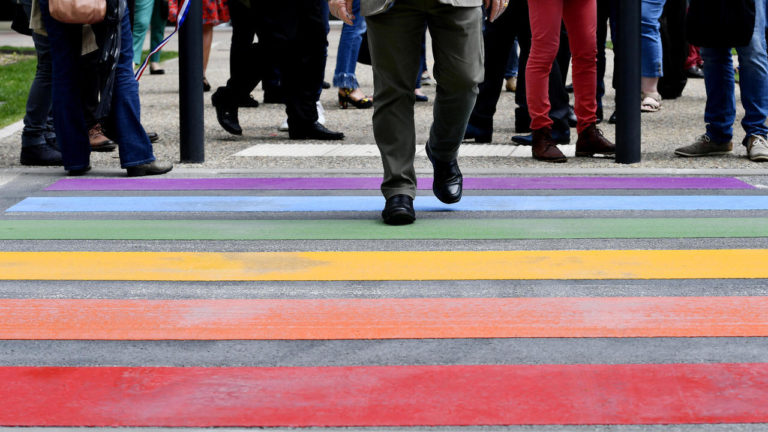

Issued on:
Covid-19 lockdowns led to an increase in anti-LGBT violence within families in France in 2020, according to associations supporting lesbian, gay, bisexual and transgender people. These groups say they have been under increased pressure to urgently find lodgings for young people thrown out on the street because of their sexual orientation.
“There have never been so many domestic violence situations to deal with,” said Matthieu Gatipon-Bachette, spokesman for the Inter-LGBT association, speaking with FRANCE 24 ahead of the the International Day Against Homophobia, Transphobia and Biphobia on May 17.
“For some young people, their coming-out to their family has gone very badly,” he added. “They usually have a support network in their school and from their friends. But, with the various lockdowns, they found themselves alone and some were confronted with violent reactions when their sexual orientation came out. Others were even thrown out of their homes by their families.”
Gatipon-Bachette, director of an accommodation centre for LGBT people in Metz, has received an unprecedented number of requests from young people living in outlying and suburban areas. Clémence Zamora-Cruz, a member of the association Au-delà du genre, which supports young transsexuals, reported a similar experience to FRANCE 24: “During the lockdown, young people called on us to mediate with their families and we had a few cases of children being chased out of their homes. We managed to get them to safety, but it was very difficult.”
A ‘misleading’ drop in anti-LGBT incidents
Anti-LGBT incidents recorded in France actually officially decreased by 15% in 2020, the ministry of the interior announced on May 12. This reported drop marked a halt to the continuous increase noted since 2016, when these figures were first published, including a steep rise over the last two years (36% in 2019 and 33% 2018).
Some 1,590 victims of homophobic or transphobic crime were recorded in France in 2020, compared to 1,870 in 2019. According to the ministry, almost a third of victims suffered “anti-LGBT” insults (31%) and a quarter suffered non-sexual physical violence (26%). Among the victims of physical violence, half (51%) were unable to return to work.
However, the ministry itself warns that these figures are “misleading” since they are based on the number of complaints registered and do not reflect the reality of anti-LGBT attacks. “Victims rarely register complaints,” the ministry stresses.
According to a survey conducted over the period 2012-2018, “only about 20% of victims of anti-LGBT threats or violence and only 5% of victims of anti-LGBT insults file complaints”, the ministry points out.
“The lockdowns strongly affected people registering complaints,” says Gatipon-Bachette. “The circulation of Covid-19 has deterred people from moving around and getting together, but victims often ask us to accompany them when they are making this type of complaint. They don’t want to go alone.”
Improving police training
A lack of police training to deal with this type of situation constitutes another obstacle. “Police don’t always record the homophobic nature of attacks,” explains Gatipon-Bachette. This is despite measures included in a three-year plan unveiled by the government last year, such as the development of ongoing training for LGBT referents within police stations and gendarmerie brigades to improve the reception of victims. “This must now be implemented”, insists Gatipon-Bachette.
On the ground, associations have decided to take their own initiative. Flag!, an LGBT+ group representing agents of the interior and justice ministries, has developed its own app to help victims anonymously report the violence they suffer on a daily basis. “When they have finished their report, they are guided towards public agencies or aid groups to ensure they receive help and no longer feel alone and isolated”, the association says.
Domestic violence goes unreported
Other obstacles are more difficult to overcome. “We sometimes don’t even realise that we are victims of homophobia when we are called a ‘faggot’ or a ‘queer’. It takes a bit of distance to realise this,” Étienne Deshoulières, a lawyer for the support network Stop Homophobie, told FRANCE 24. The association, which supports legal proceedings for homophobic insults, receives around 2,500 calls every year.
When victims are young and not supported by their families, the process becomes more complicated. “When the people close to them are not aware of their situation, younger people often don’t want to let them know that there was a homophobic element to the violence or robbery they were victims of,” explains the spokesperson for Inter-LGBT.
In this context, it is even more difficult to assess anti-LGBT violence within families. “It is extremely hard to denounce your own relatives”, notes Zamora-Cruz. This makes it even more problematic to quantify domestic violence, which means it gets excluded from official figures.
This article was translated from the original in French.